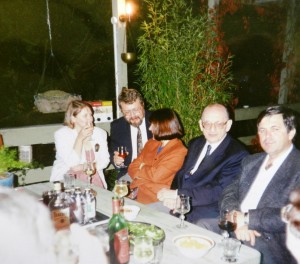Professor Wladyslaw Bartoszewski died in Warsaw on Friday 24 April 2015. He was 93. He was one of the great heroes both during and after the Second World War leading the fight against Nazi and Communist tyranny and then contributing the rebuilding of democratic Poland, including as a Polish Foreign Affairs Minister.
He was born on 19 February 1922, into a Roman Catholic family living in a Jewish neighbourhood in Warsaw and took up journalism. He took part in the defence of the city from Nazi forces in 1939. After Nazis took the city, Mr. Bartoszewski was among several thousand Poles rounded up. He became one of the first prisoners at the new Auschwitz concentration camp, bearing number 4427, but was released after less than a year because of pressure by the Red Cross.
He joined the underground Home Army’s fight against the Germans, in its Information and Propaganda Bureau under the pseudonym Teofil, the name of a character in a favourite novel, and fought during the Warsaw Uprising. He was most noted for his wartime work with the Council for Aid to Jews, code named Zegota, which saved tens of thousands of people from Nazi capture and assisted the ghetto uprising. It was for this work that Israel named him Righteous Among the Nations, a honour given to non-Jews for saving Jews during the Holocaust.
After the war, when Poland fell under Soviet domination, he returned to journalism and joined the Polish People’s Party, at the time the only opposition to Communist rule. He was accused of being a spy and spent nearly 10 years in Communist prisons before his release in 1954 on grounds of poor health. A year later, the government informed him that it had determined that he had been wrongly sentenced.
He remained a thorn in the government’s side. Because of his writings and opposition activities, he was forbidden to publish in Poland for four years beginning in 1970.
In 1980 he became an early member of the Solidarity trade union, which spearheaded the movement to overthrow Poland’s Communist government, and was briefly imprisoned again.
After the collapse of Communism, he was Poland’s ambassador to Austria in the early 1990s and foreign minister under two presidents, Lech Walesa in 1995 and Aleksander Kwasniewski in 2000 and 2001. During this period he was credited with playing a key role in a post-war diplomatic triumph: the forging of a close relationship between Poland and Germany.
At a 90th-birthday celebration at Warsaw’s Royal Castle, Mr. Bartoszewski was presented with a medallion by President Bronislaw Komorowski inscribed, “To the one who dared to be disobedient.”
In 1993 Prof. Bartoszewski visited to Australia at the invitation of the Australian Institute of Polish Affairs and I as president of the ACT Branch of the Institute and my wife Hanna have had a pleasure of hosting him at our Canberra home and to accompany him to many meetings at Parliament House. The interview he gave during the visit for SBS radio is available at:
http://www.sbs.com.au/podcasts/yourlanguage/polish/episode/407891/Prof.-W-.-Bartoszewski
Professor Wladyslaw Bartoszewski meeting leaders of the Polish community in ACT at Dr Sev and Hanna Ozdowski residence in Canberra in 1993.
